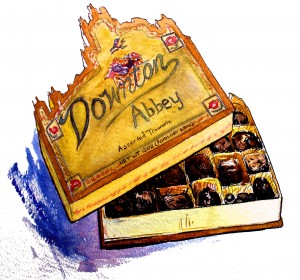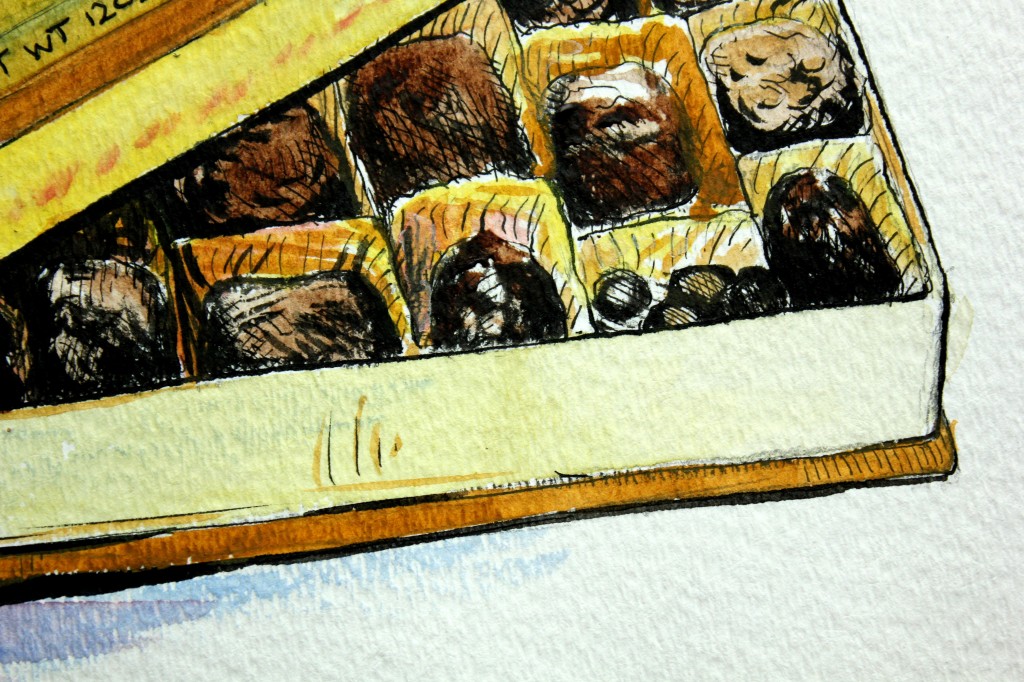I want to keep watching Downton Abbey. I really do.
It’s a show whose virtues are immediately apparent—tremendous acting from virtually the entire cast, striking cinematography, an interesting setting, and an almost obsessive eye for detail, extending to virtually all the production crafts behind the show—costuming, set dressing, even foley, every sound of the house seemingly captured a century ago and replayed now for the viewer’s pleasure.
But it is an empty pleasure indeed. Like the great house itself, which telegraphs wealth and power with every detail of its dressing and architecture but is carried on precarious financial ground, beneath all of the show’s external grace and opulence it is an emotionally bankrupt and poor thing.
I watched all three seasons of the show with two friends over a period of a few weeks, and it’s possible that this pace of viewing exacerbated the problems. To pick one particularly charged example– in the third episode of the first season, eldest daughter Mary is raped by a visitor to the house, Kemal Pamuk, who subsequently dies in her bed.
Now, you won’t see the word “rape” in the show, which is, painfully, appropriate for the time period. Mary has spent the day flirting with this handsome visitor, and when he unexpectedly shows up in her room at night, she insists he leave, rejects him, over and over again, tells him that she’ll scream, to which her rapist replies that no one will hear her. And so ends the scene, with Mary accepting the inevitable, the horrible choice that is not in fact her choice to make at all, that this man will take what he wants of her, because he wants it.
Now, this is not treated as an insignificant event. On the contrary, the events of that night drive the plot for much of the two seasons, as Pamuk’s death and the attendant coverup cause no end of scandal and labyrinthine plotting.
But what of the emotional consequences?
What is it like to have a flirtation turn to threats of violence and unwelcome sex? What if one’s rapist were to die, possibly even in the middle of the act? What kind of behaviors might we expect from someone who has experienced such traumata?
Living as we do in a society that has a much clearer picture of the horrible consequences of rape and sexual assault, not a lot of imagination is required to tease out the potential consequences of the scene. Mary might be leery of the attentions of other men. She might have difficulty with physical contact or emotional closeness from others.
And what emotional consequences do these events have for Mary in the show?
She’s sad that he died. She refers to him as her lover in conversation with her mother, and later discusses him with her husband-to-be with no sign of any distress. The first conversation is particularly painful– her mother asks point blank. Did he force himself on you? No, she says, defiantly.
Now, it is entirely plausible that Mary could retroactively deign her rape consensual, or simply choose to discuss the event in that light with her mother. But in good fiction one has some amount of access to the inner workings of a character, not just their actions and stated feelings. How different would these events read with some kind of emotional consequences? A flash of pain, a remote sadness, a squeamishness or reluctance to be touched?
But that would involve some kind of interpretation on the part of the audience, and more often than not, Downton Abbey doesn’t trust its audience to draw its own conclusions. Julian Fellowes is in many ways a very skilled writer, and in the show he applies much of this skill to the organization necessary to juggle his army of actors and assure fitting amounts of screen time. Fellowes is the literary equivalent of a virtuoso dinner host—he knows interesting people, knows when to invite them, and remembers all of their names.
(Although occasionally their occupations slip his mind, as in the scene where Edith informs Matthew that she’s the family’s first journalist. This must have come as a surprise to fellow dinner guest and family member Tom Branson, whose fledgling career as a journalist was scorned by the family several episodes prior.)
And what of the traumas of Matthew Crawley? He fights in the trenches, drags himself through the mud among the dead and dying, is nearly killed when a shell explodes directly on his position. (He also manages to telepathically communicate his distress to his paramour—but that’s a different matter). He’s paralyzed, impotent, and recovers (!) just in time for his (untelepathic) betrothed to perish of a sudden one-episode fever. Shortly thereafter he finds solace in the arms of his paramour after a previously unmentioned deathbed letter from his barely buried betrothed beseeches him to find his comfort where he can.
Are any of these events traumatic to Matthew? Does he have nightmares—do his hands ever shake? After his experiences in the war, does he have any second thoughts about hunting with the family, any difficulty hearing gunfire? Fear of confined spaces?
This insensitivity to the interior lives of the characters might be a function of the capsule-summary nature of the show—a problem arrives at the beginning of an episode, and it is dispatched in short, concentrated movements, while the other continuing plot points swirl around it. Or it might be due to the fact that the characters spend so much time talking so baldly about their own feelings. Even the most inward of characters—O’Brien comes to mind– have someone to talk to or scowl at at any given time. Just in case, you know, we’re ever unsure how they feel about having caused spontaneous abortion through deadly soap placement.
And there, finally is the word I’ve managed to avoid for almost a thousand words. Downton Abbey is a soap opera. A well-crafted soap opera, but soap opera nonetheless, with many of the characteristics that typically attend that genre. One—events are driven by a desire to create a maximum amount of dramatic effect. Two—the status quo must be maintained. Examples of the former are available in virtually every episode, but surely season two’s Canadian amnesiac burn victim is the most extreme example. As for the second, consider what happens when a character manages to escape the trajectory of the house—Thomas, for instance, or Mister Bates. No matter what Thomas’ ambitions or desires for himself, he’s forced to return to his servitude. And it’s not solely the class issues of the time that keep him in place—it’s the machinations of the plot, which require him to remain in his familiar position. Bates’ position is the reverse—he’s pulled away not by his own ambitions, but by the unfortunate consequences of the ever-escalating tension of the plots he finds himself mired in. And when he is finally freed, it’s once again off-screen providence that is his liberator, which sets him in motion to once again return to the position he had at the start of the show.
It’s instructive to compare Downton Abbey to its predecessor, the Fellowes-penned and Robert Altman-directed feature film Gosford Park. The direction of Altman and the cool cinematography of Andrew Dunn hold the content at a distance, a tack that transforms the potentially melodramatic material into an oblique commentary on the class issues present in the film. The direction and cinematography in Downton Abbey are a striking contrast to this restraint, continually (and probably unintentionally) reinforcing through sheer visual beauty the inherent right-ness of the class positions of the characters. Lord Grantham, after all, is rarely wrong, and even in the rare instances when he is, he manages to look so goddamned noble. (Stationary or smooth-moving tracking shots with low camera angles and sumptuous light in opulent environments does tend to create that effect). The lush score is one of the biggest villains in this regard. “Thiiiiis is impoooooorrrtant!” the strings say, swelling again. “Feeeeel the nobiiiiiiiiiiiiiility.” This insistence on the part of the cinematography and the underscoring can not only seem overwrought, it can even spoil the effect of certain scenes, by telegraphing the future events minutes before they happen. All three of us watching the last episode together were aware of the impending death of Matthew Crawley from the moment we saw his car, background speeding by, with portentous strings sawing away in the soundtrack. It’s hard not to feel that a character has been killed, murdered, really, by the show itself, when the dressings of the show seem to be so aware of every upcoming disaster.
When I informed my friend James as to the content of this article, he asked me, “So, you didn’t enjoy the show?” No, I’m afraid I did enjoy the show. I enjoyed it too much, and it was packaged so handsomely and tasted so good and went down so smoothly I could hardly believe it. And so I had some more. And then I had some more.
But there are a lot of things I enjoy that I shouldn’t have every day. And in Downton Abbey‘s case, three boxes in a month were clearly too much.


